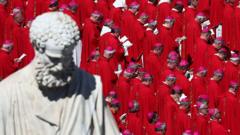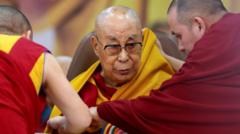This article explores the heavily guarded process that shrouds the election and the stakes involved as cardinals enter total lockdown to deliberate.
Conclave: The Secrecy Surrounding the Selection of a New Pope

Conclave: The Secrecy Surrounding the Selection of a New Pope
As 133 cardinals prepare to choose a pope, a cloak of secrecy envelops the Vatican's historic conclave.
In just a few days, 133 Catholic cardinals will convene in the Sistine Chapel for one of the most secretive elections imaginable: the selection of a new pope to succeed Pope Francis. Upon entering, each cardinal is required to take an oath on the gospels, promising to maintain confidentiality about the proceedings for life. This vow extends not just to the electors but to anyone present in the Vatican during the conclave, including medical personnel and support staff.
To ensure that the election remains confidential, both the chapel and the nearby guesthouses will be thoroughly swept for surveillance devices, while electronic jammers will prevent any unauthorized communications. "The Vatican takes the idea of isolation extremely seriously," remarked John Allen, editor of Crux news site. The conclave is designed not only to protect the secrecy of the voting but also to guard against "nefarious forces" that could potentially interfere in this significant decision.
Once inside, the cardinals will surrender all electronic devices and are under strict orders to avoid any contact with the outside world—a situation enforced by the Vatican's own police. Monsignor Paolo de Nicolo, former head of the papal household, explained that every precaution is taken to prevent any external influences. "You can't even open the windows because many rooms overlook the outside world," he stated.
While the conclave is cloaked in secrecy, media interest in the lead-up to the election has prompted scrutiny of the cardinals themselves. With Pope Francis's passing, the Italian press and onlookers have taken on the role of “cardinal hunters,” eager to uncover insights or allegiances among the electors. Despite their official silence, speculation swirls, and outlets like La Repubblica have taken note of the cardinals' “last suppers” before the lockdown.
As more than 250 cardinals assemble in Rome to participate in the electoral process, those eligible to vote are constrained from engaging with the media. Even so, there is considerable intrigue regarding potential candidates who may take the papal throne. Critics and influential voices attempt to shape the narrative through various media, even targeting likely front-runners with subtle critiques or unexpected publicity stunts.
With the conclave set to commence, observers note that while outside influences strive to make their mark, the voting cardinals are determined to shut out distractions. Although discussions may emerge about liberal versus conservative ideologies or the latest trends swirling around public debate, the core of the decision remains faith-driven. As cardinals enter into total seclusion, the hope is that divine guidance will shape the outcome of this pivotal moment for the Catholic Church.
To ensure that the election remains confidential, both the chapel and the nearby guesthouses will be thoroughly swept for surveillance devices, while electronic jammers will prevent any unauthorized communications. "The Vatican takes the idea of isolation extremely seriously," remarked John Allen, editor of Crux news site. The conclave is designed not only to protect the secrecy of the voting but also to guard against "nefarious forces" that could potentially interfere in this significant decision.
Once inside, the cardinals will surrender all electronic devices and are under strict orders to avoid any contact with the outside world—a situation enforced by the Vatican's own police. Monsignor Paolo de Nicolo, former head of the papal household, explained that every precaution is taken to prevent any external influences. "You can't even open the windows because many rooms overlook the outside world," he stated.
While the conclave is cloaked in secrecy, media interest in the lead-up to the election has prompted scrutiny of the cardinals themselves. With Pope Francis's passing, the Italian press and onlookers have taken on the role of “cardinal hunters,” eager to uncover insights or allegiances among the electors. Despite their official silence, speculation swirls, and outlets like La Repubblica have taken note of the cardinals' “last suppers” before the lockdown.
As more than 250 cardinals assemble in Rome to participate in the electoral process, those eligible to vote are constrained from engaging with the media. Even so, there is considerable intrigue regarding potential candidates who may take the papal throne. Critics and influential voices attempt to shape the narrative through various media, even targeting likely front-runners with subtle critiques or unexpected publicity stunts.
With the conclave set to commence, observers note that while outside influences strive to make their mark, the voting cardinals are determined to shut out distractions. Although discussions may emerge about liberal versus conservative ideologies or the latest trends swirling around public debate, the core of the decision remains faith-driven. As cardinals enter into total seclusion, the hope is that divine guidance will shape the outcome of this pivotal moment for the Catholic Church.




















